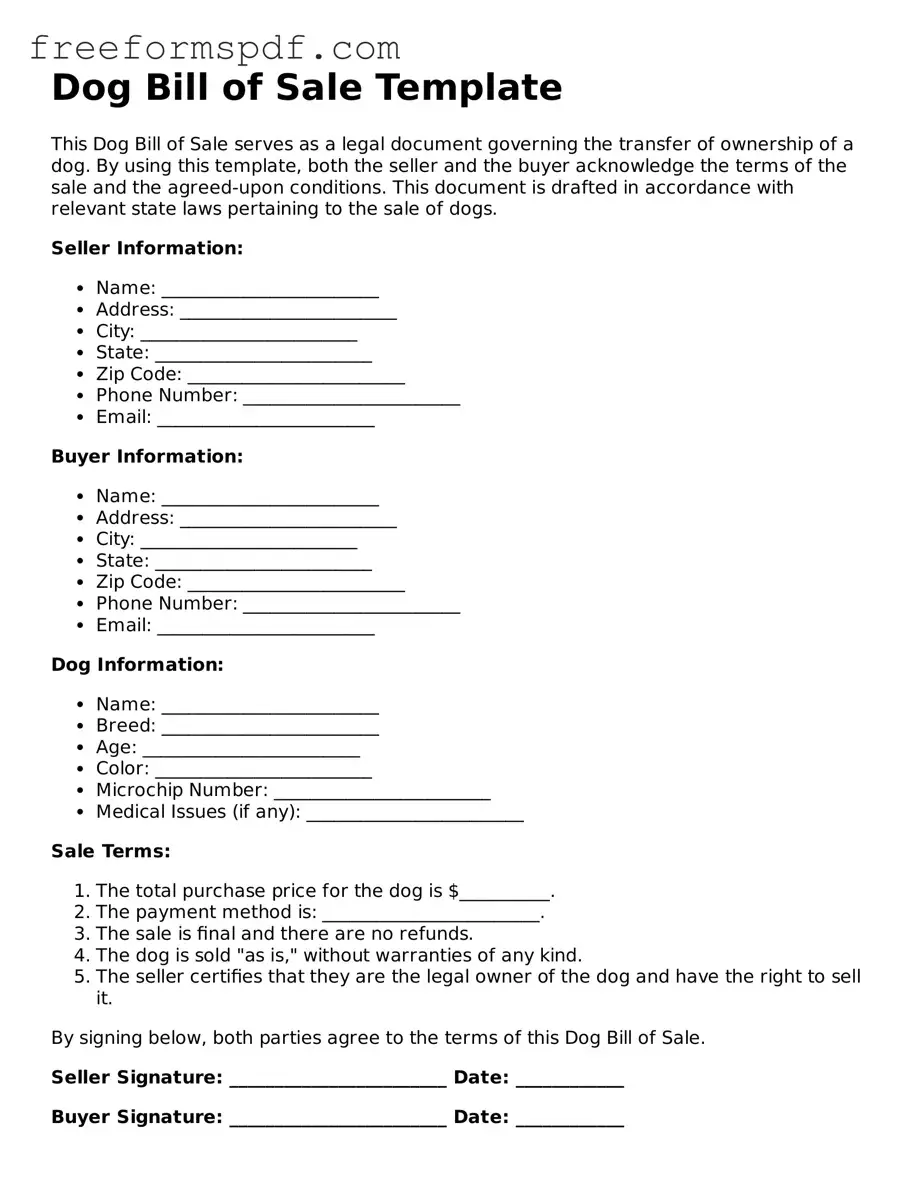Dog Bill of Sale Document
Dog Bill of Sale - Customized for Each State
Common mistakes
-
Incomplete Information: Failing to provide all required details about the dog, such as breed, age, and health status, can lead to misunderstandings.
-
Incorrect Seller or Buyer Details: Listing the wrong names or contact information for the seller or buyer can create confusion and hinder communication.
-
Omitting Payment Details: Not specifying the sale price or payment method can result in disputes later on.
-
Neglecting Signatures: Both parties must sign the document. Failing to do so invalidates the sale.
-
Not Including Terms of Sale: Leaving out any conditions or guarantees related to the sale can lead to disagreements regarding the dog's health or behavior.
-
Forgetting to Date the Document: A missing date can complicate the timeline of the sale and affect any legal claims in the future.
-
Ignoring Local Regulations: Not checking local laws regarding dog sales can lead to legal issues, especially if specific requirements are not met.
Learn More on This Form
-
What is a Dog Bill of Sale?
A Dog Bill of Sale is a legal document that serves as a receipt for the sale of a dog. It outlines the terms of the sale, including the purchase price, the seller's and buyer's information, and details about the dog being sold. This document is important for both parties as it provides proof of ownership transfer and can be useful for future reference, such as registration or medical records.
-
Why do I need a Dog Bill of Sale?
Having a Dog Bill of Sale is essential for several reasons. First, it protects the rights of both the buyer and the seller. For the buyer, it confirms ownership and can help in case of disputes. For the seller, it provides evidence that they no longer own the dog, which can be crucial if issues arise later. Additionally, some states may require a bill of sale for pet ownership transfers, making it a necessary document.
-
What information should be included in the Dog Bill of Sale?
A comprehensive Dog Bill of Sale should include:
- The names and addresses of both the buyer and the seller.
- A detailed description of the dog, including breed, age, color, and any identifying marks or microchip information.
- The sale price and payment method.
- The date of the sale.
- Any warranties or guarantees regarding the dog's health or behavior, if applicable.
-
Is a Dog Bill of Sale legally binding?
Yes, a Dog Bill of Sale is generally considered a legally binding contract. Both parties must agree to the terms outlined in the document. However, the enforceability can depend on state laws and whether the document meets certain legal requirements. It is advisable to have both parties sign the document and keep a copy for their records.
-
Can I create my own Dog Bill of Sale?
Yes, you can create your own Dog Bill of Sale. While templates are available online, it is important to ensure that your document includes all necessary information and complies with your state’s laws. Customizing the bill to fit your specific transaction can help clarify the terms and protect both parties involved in the sale.
Misconceptions
When it comes to the Dog Bill of Sale form, there are several misconceptions that people often have. Understanding the truth behind these myths can help ensure a smoother transaction when buying or selling a dog.
- It’s not necessary to have a Dog Bill of Sale. Many people believe that a verbal agreement is enough. However, having a written document protects both the buyer and the seller in case of disputes.
- The form is only for purebred dogs. This is false. A Dog Bill of Sale can be used for any type of dog, whether purebred or mixed breed.
- It’s only important for breeders. While breeders often use it, anyone selling or buying a dog should have a bill of sale to clarify ownership and terms.
- Once signed, the bill cannot be changed. This is a misconception. Both parties can agree to modify the document if needed, as long as it’s done in writing.
- The form is only for sales involving money. Not true. A Dog Bill of Sale can also be used for gifts or trades involving dogs.
- It’s a complicated document. In reality, the Dog Bill of Sale is usually straightforward and easy to fill out. It typically includes basic information about the dog and the transaction.
- It’s not legally binding. A properly completed Dog Bill of Sale is a legal document. It can be used in court if necessary.
- All states have the same requirements. This is incorrect. Different states may have varying laws regarding the sale of animals, so it’s important to check local regulations.
- You don’t need to keep a copy. Keeping a copy of the signed Dog Bill of Sale is essential. It serves as proof of ownership and the terms of the sale.
Understanding these misconceptions can help ensure that both buyers and sellers are well-informed and protected during the transaction process.
Other Types of Dog Bill of Sale Forms:
Motorcycle Sale Agreement - Encourages honesty in the sale of used motorcycles.
In addition to understanding the core principles of confidentiality, it is crucial to have access to reliable resources when drafting a New York Non-disclosure Agreement. For comprehensive templates and guidance, you can refer to NY Templates, which provide valuable insights to help ensure your agreement is thorough and legally sound.
Simple Bill of Sale for Car - A Motor Vehicle Bill of Sale is a legal document that records the sale of a vehicle between a buyer and a seller.
